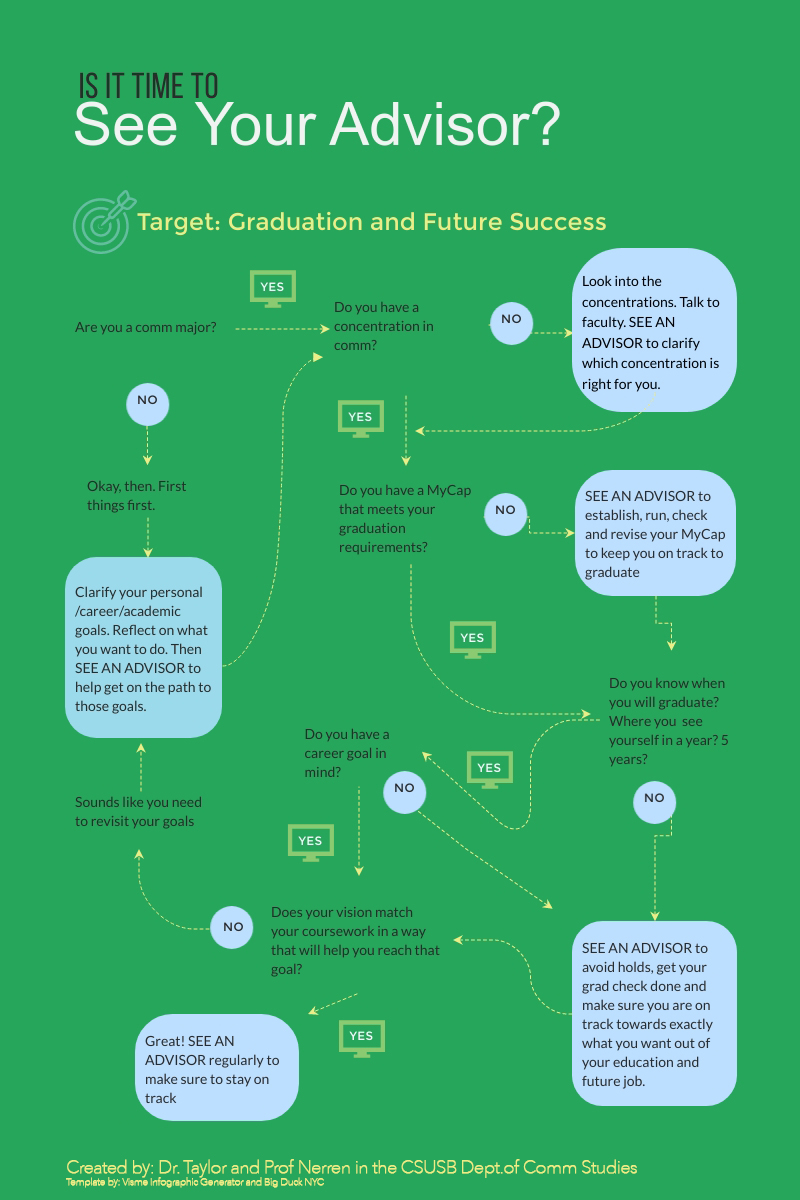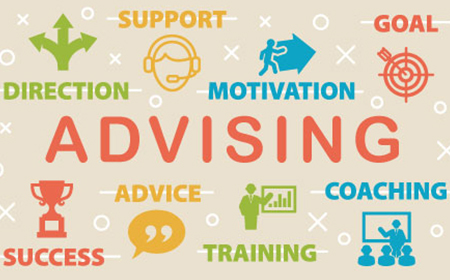

Holds
For students who have not completed an advising requirement, a registration hold may be placed on their records. Please check for registration holds on MyCoyote>Student Center BEFORE your registration date to avoid any delays. Holds can be placed on student records for a variety of reasons. To understand the nature of the hold, click on the details and follow the instructions.
You can also contact the Comm Studies Department ASC (Administrative Support Coordinator): TEL 909-537-5815, EMAIL Crystal.Escalera@csusb.edu, or visit our office UH-018.
Advising Forms
- Simultaneous Enrollment
- Course (Unit) overload
- Internship form
- Independent study
- Advising & Academic Services
(If your form is unavailable online, please request a copy from the department office in UH-018 or email the Department's Administrative Support Coordinator, Crystal.Escalera@csusb.edu)

What to expect in Advising
Advising is here for you! Your advisor can help you make sure you graduate in a timely manner, with the classes that help you the most towards your career aspirations and life goals.
You will meet, go over your MyCap, make any adjustments as necessary, answer any questions you have, and then ... once you know which courses to take each semester, you're done! As easy as that. We have it boiled down to an easy and painless process to ensure your greatest success.

What to Bring
There are a few things useful to bring to your advising meeting:
- A list of any questions you have about your major and your concentration
- A shortlist of electives you may be most interested in
- A completed planning form if provided to you in Comm2101
- Any information on your long term goals, or other questions you may have
Faculty By Concentration
Sometimes it is useful to know what faculty member is in what concentration. Your communication core classes and electives may be taught by individuals inside or outside your concentration, providing you a well rounded background in Communication Studies by the time you complete your degree.
What is Advising?
Advising helps students graduate faster, focus their studies, streamline their path to graduation requirements, and help avoid speed bumps along the way like duplicate coursework.
I would like to enroll in your class but the class is full. Can you please add me? Is there a waiting list? What do I do?
If there is a full class, you can get on the waiting list if you do not have any holds and if you are fully paid. If your status changes you may lose your spot in line so it is important to watch this carefully. You can do this in your cart in student center. One great way to follow up on this is to have this conversation in person by going to class on the first day and introducing yourself to the professor or instructor politely with an add form ready. You can get this form in UH018. You need to be fully prepared with a backup plan because you may or may not get into this class this term and that it is up to the professor or instructor if the class is full to exceed capacity and many will not do it to preserve the small student to faculty ratio in their classes for the benefit of the student.
How often should I run my PAWS?
It is a good idea to do all the time! You can check your status toward completion, your GPA, your transfer credits and more! Instructions on how to run PAWS...
How often should I see an advisor?
It is a good idea to see an advisor each quarter to stay on top of your graduation plan and avoid any holds or duplications of graduation requirements.
What is the difference between faculty advising and CAL advising?
They are both great! But they are different in important ways. CAL advising can help you with your classes, your MyCap, your PAWS and removing holds. They can make sure you ae on track for graduation. Faculty advising is discipline specific and can answer questions you may have about your major, your future, your concentration, your job prospects connected to your coursework, and other elements of advising related to talking to someone who has been in and taught in the field of Comm for years.
I'm going through Q2S. Do I need to do anything different?
Yes! You should be making your Q2S advising appointments with CAL advising or a faculty advisor to avoid holds. Make sure that your MyCap is up to date and keep checking your PAWS often. If all this sounds like something that you've never heard before, meet with your advisor immediately and they can help make sure that your transition will be smooth.Please do not wait until the last minute to seek advising. You should also be meeting with CAL advising regularly. ESPECIALLY if you are part of the quarter to semester conversion.
What is CAL advising?
CAL advising is open and available for you anytime. Their office in UH203 holds great hours and has professional advisors who are a great first meeting point for you with any of your advising questions. Visit them often, at least twice a year if not more, to make sure to stay on top of everything. CAL Advising...
Who is my advisor?
You may have an advisor assigned to you. You may also not know who your advisor is and need to ask at the department office. You can also get advising from CAL advising at any time.
How does advising help me?
Small scale, advising can help you save money and graduate faster. Big scale, advising can help you reach for your dreams and stay connected to what brought you to CSUSB in the first place. Seeing your advisor regularly will help in so many ways!
